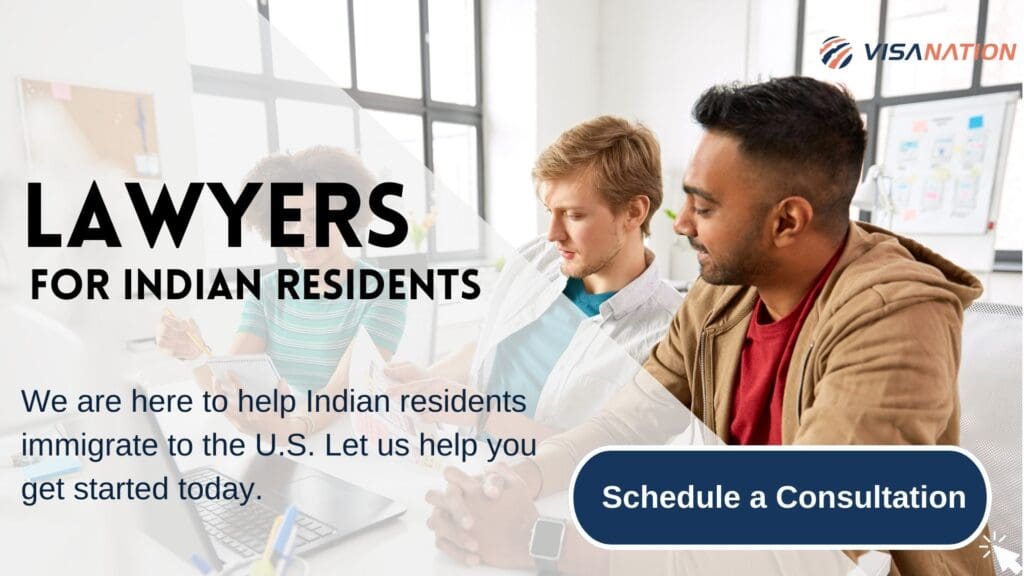How to Move to USA from India in 2023: Complete Guide
Moving to a new country is an exciting adventure that comes with its own set of challenges. Especially the U.S., which is one of the best and easiest countries to immigrate to. If you’re an Indian planning to relocate to the U.S., this comprehensive guide is here to help you navigate the immigration process with confidence. From visa options to settling into your new life, we’ll cover all the essential steps to make your move to the U.S. a smooth and successful one. Let’s dive into this complete guide for Indian immigrants moving to the U.S. Our lawyers help to bring numerous residents from India to the U.S. every year. We make the entire process seamless and quick, schedule a consultation today!
We make India to the U.S. immigration easy and simple
Schedule a Consultation
Research and Plan Your Move From India to the USA
Start by conducting thorough research about the U.S. Understand its culture, lifestyle, employment opportunities, and cities to determine which areas align with your goals and preferences. Consider factors such as cost of living, climate, healthcare, and educational institutions. Create a checklist of important documents, financial requirements, and deadlines to stay organized throughout the process.
Visa Options for Indians Moving to USA
Familiarize yourself with the various visa options available for Indian immigrants:
Employment-Based Visas
Although there are many work visa types in the U.S. here are some of the most popular ones:
- H-1B Visa: The H-1B visa is designed for highly-skilled workers in specialty occupations. It requires sponsorship from a U.S. employer and has specific criteria, such as a minimum educational requirement and a labor condition application.
- L-1 Visa: The L-1 visa is available for intra-company transferees who are being relocated to a U.S. branch, subsidiary, or affiliate of their current employer. It requires proof of employment with a qualifying organization and specialized knowledge or managerial/executive roles.
- EB-5 Visa: The EB-5 visa is for immigrant investors who are willing to make a substantial investment in a new commercial enterprise that creates jobs in the U.S. This category requires a significant capital investment and compliance with specific requirements.
Family-Based Visas
- IR (Immediate Relative) Visa: This category is for close relatives of U.S. citizens, including spouses, unmarried children under 21 years old, and parents of U.S. citizens who are at least 21 years old. There is no numerical limit for IR visas, making them readily available to eligible applicants.
- F (Family Preference) Visa: The F visa category includes unmarried adult children, married children, and siblings of U.S. citizens. These visas have a numerical limit and longer waiting times compared to IR visas. The availability of F visas depends on the family relationship and the U.S. citizen’s status.
Diversity Visa Lottery
The Diversity Visa Lottery, also known as the Green Card Lottery, is an annual program that provides a limited number of immigrant visas to individuals from countries with low immigration rates to the U.S. Participants are selected through a random drawing. Eligibility is based on specific criteria, such as having a high school education or its equivalent, and applicants must meet other requirements.
It’s never been easier to move from India to the U.S.
Schedule a Consultation
Gather Required Documents
Gathering the required documents is a crucial step in the immigration process as they serve as proof of your identity, qualifications, and eligibility. Here are some key documents you may need to collect for your immigration application:
- Passports: Ensure that your passport is valid and will remain so for the duration of your stay in the U.S. Make copies of your passport and keep them in a safe place as a backup.
- Birth Certificates: Obtain certified copies of your birth certificates for yourself and any accompanying family members. If the birth certificates are not in English, have them translated by a certified translator.
- Educational Certificates: Collect your educational certificates, including diplomas, degrees, and transcripts. If they are issued in a language other than English, have them translated and certified.
- Marriage Certificates: If you are married, gather your marriage certificate as proof of your marital status. Translate and certify it if necessary.
- Police Clearances: Some visa categories may require police clearance certificates from the countries where you have lived. Research the specific requirements and obtain these clearances accordingly.
- Medical Records: Certain visa types may necessitate a medical examination conducted by an authorized physician. Keep records of any vaccinations or medical treatments you have received.
- Financial Documents: Prepare documents to demonstrate your financial stability, such as bank statements, tax returns, employment letters, and investment records. These documents may vary depending on the visa category you are applying for.
- Affidavit of Support: If you have a family member or sponsor in the United States, they may need to provide an Affidavit of Support to demonstrate their financial ability to support you during your initial period in the country.
- Photographs: Check the specific requirements for passport-sized photographs and ensure you have an adequate number for your application.
- Other Supporting Documents: Depending on your visa category, additional documents may be required. For example, if you are applying for an employment-based visa, you may need letters of recommendation, job offer letters, or proof of work experience.
Hire an Immigration Attorney
Seeking the assistance of an experienced immigration attorney can greatly simplify the process. They can provide personalized guidance, help with visa applications, and navigate the intricacies of the immigration system based on your unique circumstances. Research and select an immigration attorney who has expertise in Indian immigration to the U.S. Our immigration lawyers are always here to help you, schedule a consultation today.
File the Application
When filing your visa application with the USCIS, it is essential to complete the required forms accurately and thoroughly. The specific forms you need to submit will depend on the type of visa you are applying for. Some commonly used forms include:
Form DS-160: This form is required for most nonimmigrant visa applications and collects biographical information, including personal details and travel history.
Form I-129: This form is used for employment-based visas, such as the H-1B or L-1 visas. It requires information about the employer, job position, and the employee’s qualifications.
Form I-485: This form is used for adjusting status to permanent resident within the U.S. It collects information about the applicant’s background, immigration history, and eligibility for permanent residency.
Form I-130: This form is used for family-based immigrant visas and establishes the relationship between the petitioner (the U.S. citizen or permanent resident) and the beneficiary (the immigrant seeking the visa).
Form I-765: This form is used to apply for an Employment Authorization Document (EAD), which allows certain nonimmigrants to work in the U.S.
Form I-864: This form is used for an Affidavit of Support and is required for most family-based immigrant visa applications. It demonstrates that the petitioner has sufficient financial means to support the intending immigrant.
Attend Visa Interviews
Prepare thoroughly if your visa application requires an interview. Research commonly asked interview questions and gather all the necessary supporting documents to bring with you. Practice your responses to showcase your qualifications and reasons for immigrating to the U.S. During the interview, be confident, honest, and concise in your responses.
Unlock the power of living and working in the U.S.
Schedule a Consultation
Steps for Preparing for the Move from India to the USA
Once your visa is approved, it’s time to start preparing for your relocation to the USA. Here are some essential steps to ensure a smooth transition:
- Notify Your Employer: If you’re currently employed, inform your employer about your upcoming move and discuss any necessary arrangements. This includes discussing the possibility of transferring to a U.S. branch of your company, obtaining any required documentation or letters of support, and discussing the logistics of your departure and start date in the U.S.
- Logistics of Moving: Begin making arrangements for the logistics of moving your belongings from India to the U.S. Research and compare international moving companies to find one that suits your needs and budget. Obtain quotes and inquire about the necessary documentation, customs regulations, and shipping options. Consider whether you will be shipping your furniture and belongings or if it’s more practical to sell or store them.
- Housing Options: Research housing options in your chosen destination in the U.S. Consider factors such as proximity to your workplace, schools, and amenities. Online real estate platforms can provide information on available rental properties or properties for sale. Consider renting initially to give yourself time to familiarize yourself with the area before making a long-term housing commitment. If possible, visit your new city beforehand to explore different neighborhoods and gain a better understanding of the local housing market.
- Schools and Education: If you have children, research educational institutions in your new location. Consider factors such as the quality of schools, curriculum, extracurricular activities, and proximity to your residence. Reach out to schools to inquire about enrollment procedures, required documents, and any specific considerations for international students. It may be helpful to connect with other Indian families in the area who can provide insights and recommendations regarding schools.
- Healthcare Facilities: Familiarize yourself with healthcare facilities and services in your new location. Research hospitals, clinics, and doctors in the area. Consider the availability of healthcare coverage through your employer or explore options for private health insurance. It’s important to understand how to schedule appointments, access emergency services, and navigate the healthcare system in the U.S. Take note of any required vaccinations or medical records you need to carry with you.
- Essential Services: Research and make a list of essential services you may need upon arrival. This includes setting up utilities such as electricity, water, internet, and cable services. Research local transportation options, including public transportation, car rentals, or purchasing a vehicle. Familiarize yourself with local grocery stores, banks, and other necessary services to ensure a smooth transition.
- Relocation Services: Consider contacting relocation services that specialize in assisting immigrants to make the process smoother. These services can provide guidance and support in various aspects of your move, including finding housing, navigating the local bureaucracy, and settling into your new community. They can offer valuable insights and assistance tailored to your specific needs and requirements.
Settling In
Upon arrival in the U.S., familiarize yourself with local laws, customs, and cultural norms. Open a bank account to manage your finances efficiently and obtain a driver’s license or state identification card. If required, apply for a Social Security Number (SSN) to access various services and opportunities. Research and understand the process for obtaining an SSN in your state.
Join local community groups and organizations to meet new people and build a support network. Engage in activities and events that align with your interests to integrate into the local community. Familiarize yourself with public transportation options and explore your new surroundings.







